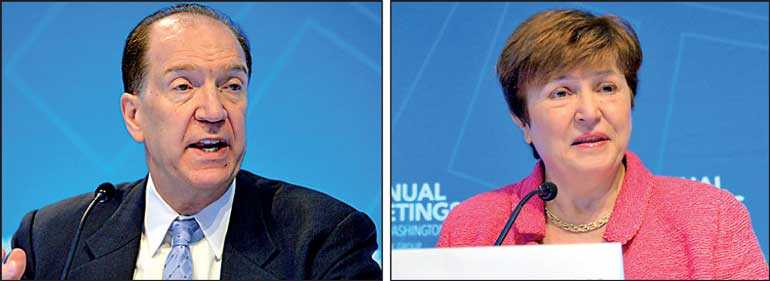Saturday Feb 21, 2026
Saturday Feb 21, 2026
Friday, 18 October 2019 00:18 - - {{hitsCtrl.values.hits}}

By Nisthar Cassim in Washington DC
The International Monetary Fund (IMF) and the World Bank (WB) yesterday in Washington DC separately called on countries, especially those developing, to aggressively pursue structural reforms to spur inclusive higher growth, which remains a challenge globally.
“Broad-based growth is still possible for countries. With the right mix of policies and structural reforms, countries can unleash growth that’s broadly shared across all segments of society,” World Bank Group President David Malpass told journalists during the ongoing annual meetings of the WB and the IMF in Washington DC.
“This is especially true in emerging markets and developing countries, where well-designed reforms can deliver meaningful gains. In short, we seek material impact in terms of broad-based growth, transparency, the rule of law and private-sector expansion,” he added.
“This week I’ll have a simple message for countries: The choices you make now, matter,” the WB Chief said.
“Well-designed structural reforms are needed to unlock growth and build the foundations for future prosperity. Problems include oligopolies, excessive public-sector employment and pension promises, and subsidies for goods, services and financing. I’m aware of the strong resistance to many reforms. But they’re crucial for enabling broad-based, sustainable growth,” Malpass emphasised.
In a separate briefing, IMF Managing Director Kristalina Georgieva listed structural reforms as one of the five priorities countries needed to pursue to improve growth prospects. Another priority shared by the IMF Chief was that the world, especially the US and China, must undo the harm inflicted on trade and finding lasting solutions.
“We need to move from a trade truce to a trade peace,” she said, adding that trade, apart from other benefits such as stimulating growth and jobs, guarantees global peace.
Other priorities recommended by the IMF Chief were the use of monetary policy wisely, fiscal policy playing a more central role and stronger international cooperation to resolve common global issues.
Though the IMF Chief listed monetary and fiscal policy measures among her five priorities, in contrast her WB counterpart sounded wary. Noting that countries need to be careful about how they calibrated responses to the global slowdown, Malpass said many had already used up their fiscal and monetary policy space, so “structural reforms are essential”.
On Tuesday, the IMF downgraded global growth for 2019 to 3%, the lowest in a decade while for 2020 it is forecast at 3.4%. Growing trade and geopolitical tensions were listed as contributors for what the IMF described as a “synchronised slowdown” in growth globally.
“Nearly 90% of the world is experiencing slower growth,” Georgieva told global media, including the Daily FT, covering the 2019 Annual Meetings of the Fund and the Bank in Washington DC.
WB Chief Malpass also confirmed that global growth was slowing and investment was sluggish, with manufacturing activity becoming soft amidst weakening trade. Additionally, the challenges of climate change and fragility were making poor countries more vulnerable.
“This backdrop makes our goals of reducing extreme poverty and boosting shared prosperity even harder. About 700 million people still live in extreme poverty. That’s about one in 12 people on the planet,” he added.